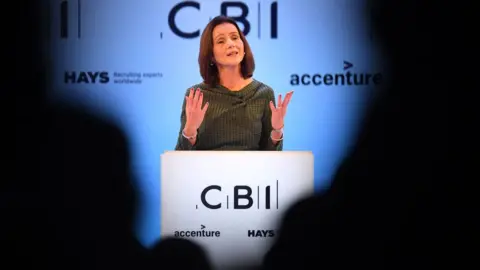Firms can't cope with no deal and virus - CBI boss

 Getty Images
Getty ImagesBritish firms do not have the resilience to cope with a no-deal Brexit after the battering of the coronavirus crisis, according to the outgoing boss of industry body the CBI.
Carolyn Fairbairn said a CBI member had likened a no-deal to "setting the shed on fire" while the house was in flames.
Brexit trade negotiations have not been going well between the UK and the EU.
A government spokesperson said the UK wanted to reach an agreement with the EU this year.
Dame Carolyn Fairbairn told the BBC that any buffers to cope with the additional cost and planning of an exit from the EU customs union and single market without a deal had been exhausted by the Covid-19 pandemic.
"The resilience of British business is absolutely on the floor," she said.
"Every penny of cash that had been stored up, all the stockpiles prepared have been run down.
"The firms that I speak to have not a spare moment to plan for a no trade deal Brexit at the end of the year - that is the common sense voice that needs to find its way into these negotiations."
Those negotiations are not going well. They broke up last week with the EU's chief negotiator saying that very little progress had been made on key sticking points, including future fishing rights in UK waters, and commitments to maintain a "level playing field" over regulation and competition.
The devastating impact of Covid-19 and the fight for business survival has diverted management attention away from any Brexit contingency planning, according to Dame Carolyn, who worries that a political commitment to abandon the current transitional trading arrangements - come what may - will add to the burden on business at a critical moment.
"As one member put it to me - just because the house is on fire, it doesn't make it ok to set fire to the garden shed.
"If we have a political timescale that takes us to a brinksmanship deal in December that will be catastrophic for British business - they will not be ready.
"Small businesses were not ready last time there was a no-deal Brexit threat - this time they will not have had a moment to prepare for it."
Dame Carolyn's comments come as the CBI - the UK's most influential business group - confirmed she will be succeeded as director general by Tony Danker in November.
Mr Danker is currently chief executive of Be the Business, an organisation set up to improve the efficiency and productivity of UK businesses. A former media executive, he was also a policy adviser to the Treasury.
Brexit strain
Relations between business groups and the government have been strained ever since the campaign leading up to the EU referendum of 2016, when business groups, including the CBI, warned of economic damage to the UK economy whose biggest customer is the EU.
Dame Carolyn is hopeful that this crisis can help build bridges in the face of a common and deadly health and economic enemy.
"Government realises it needs business and business understands how much it needs government," she said.
She described the government's intervention to support workers wages during the lockdown as a "vital way for the economy to hibernate".
But the CBI on Thursday urged the government to focus on how the UK emerges from that hibernation.
In a letter to the Prime Minister, Dame Carolyn called on the government to make employment for young workers the government's top priority, as well as ensuring the UK emerges from the crisis with a focus on investment in environmentally sustainable industries.
Dame Carolyn was set to stand down this year anyway, but agreed to extend her term until the end of the year given the ongoing health and economic crisis.
This is not the swansong she would have wanted. The UK is forecast to experience the worst economic downturn of any major European economy according to figures out yesterday from the OECD.
A government spokesperson said: "We've been clear that we want to reach an agreement with the EU this year and we are prepared to work hard to accelerate talks. This was what both sides agreed to in the political declaration.
"If we don't negotiate a Canada-style FTA [free trade agreement], we'll leave with an Australia-style relationship. Whatever happens we will be leaving the single market and customs union at the end of this year.
"We have taken unprecedented action to support businesses through this pandemic and to ensure the UK's economic recovery is as strong and as swift as possible. Extending the transition period would simply prolong the negotiations and create more uncertainty for businesses."
